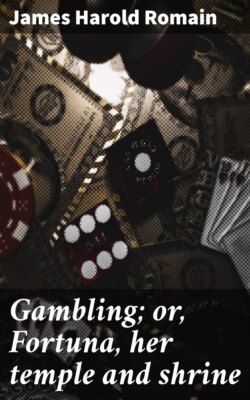Читать книгу Gambling; or, Fortuna, her temple and shrine - James Harold Romain - Страница 4
На сайте Литреса книга снята с продажи.
Introduction.
ОглавлениеTable of Contents
INTRODUCTION.
A traveler once sought to explore an unknown country. Compass he had not, and both chart and guide were wanting. In the distance a mountain loomed above the plain. To its summit our traveler made his way. From thence he beheld the region stretching away in all directions. The land he would traverse the eye could now sweep from center to circumference. It was not possible to know the landscape in detail, but the relative proportions, distances and boundaries were unfolded at his feet. So, when properly conceived, with the introduction to a book. A perspective of the topic is conducive to a better understanding of its scope and purpose. My object is to sustain the following propositions:
First.—Men have gambled in all ages of the world. That they will continue to do so is a reasonable presumption. To gamble would seem instinctive—inherent in the souls of mankind and fostered by the very nature of their environment. History reveals that all alike are possessed by this subtle passion—male and female, young and old, good and bad, wise and unwise, rich and poor, the exalted and the lowly. In every century may be seen a motley throng kneeling in devotion at the feet of Fortuna. Eagerly about her shrine press the mighty concourse of emperors, kings, chieftains, statesmen, ecclesiastics, savants, philosophers, poets, soldiers and the wayfaring. Now and ever will mankind court the mysterious and uncertain.
Second.—To define a wager is to defy intolerance of opinion. Truth is not absolute but relative. It is not to be established ex cathedra. Moralists are not in a position to denounce gambling per se. They are not yet agreed upon the unconditioned principles of right and wrong. Before it can speak with authority, moral philosophy must find an ultimate, self-evident and irrefragable foundation. That it is essentially criminal or necessarily vicious to invoke a chance has never been demonstrated. To live is to gamble. We all wager in one way or another. Luck is appealed to in every department of human activity. Everywhere uncertainty is the rule and certainty the exception. In the business world vast realms are specifically founded upon the doctrine of chances. If absolutely wrong, then gambling should be discountenanced in all persons under every circumstance. In whatever guise it should be condemned as a principle. Until this has been done society is not in a position to punish in one person what it permits or commends in another. In its treatment of gambling the law is now inconsistent, unjust and hypocritical.
Third.—Man is the creature of circumstances. Society is an organism conditioned by its environments. Every nation must complete a cycle of infancy, youth, manhood and old age. Briefly, history is a science—an unbroken chain of causes and effects throughout the ages. Volition, so-called, is delusive and shadowy—more apparent than real. At best, we but yield to the greatest pressure of temperament or motive. Human nature, in a word, is the result of inevitable tendencies. The passions are inherent and cannot be violently uprooted. Character is innate and not subject to arbitrary reform by extrinsic force. Here, as elsewhere, evolution is the law of existence. While our appetites and propensities may be educated, they can never be obliterated. Social and political philosophy have repeatedly deduced these truths from the history of man. In the field of reform officialism has been repudiated by the greatest thinkers. Legislation, therefore, should conform to the light of experience and the dictates of science. Ergo: in the future, as in the past and present, the gaming passion will everywhere assert itself, despite repressive legislation, however severe.
Fourth.—Sumptuary statutes are futile and impertinent. They are to-day and ever have been indefensible and impolitic. Such laws are an infringement upon individual rights and an insult to human nature. Officious and pharisaical legislation in the province of morals and taste should be abandoned once and forever. Per se, to gamble is neither a sin nor a crime. For the law to punish the practice is futile and unwarranted.
Conclusion.—An enlightened age demands the overthrow of an effete administrative policy. In the realm of morals, let that be wisely guided which the law cannot prevent. Gambling, with certain conditions, should be licensed and placed under the surveillance of a police.
